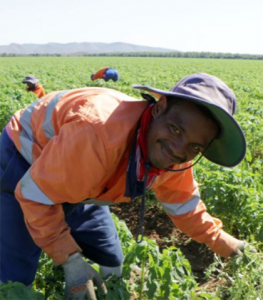Asylum seekers helping to bring in the harvest
Asylum seekers are stepping up to help Victoria’s agricultural producers continue to operate amid labour shortages triggered by the COVID-19 lockdowns.
In just one example, Koala Cherries, at Yarck, in central Victoria, has recruited six asylum seekers – from Ethiopia, Iran, and Bangladesh – to help pick and pack cherries.
 One of the recruits is Mizamu Mahari, 28 year-old electrical specialist from Ethiopia, who came from Melbourne in mid-November to help fill the huge demand for agricultural labour.
One of the recruits is Mizamu Mahari, 28 year-old electrical specialist from Ethiopia, who came from Melbourne in mid-November to help fill the huge demand for agricultural labour.
“I’ve never been outside of the city, so I was afraid for the first time … now, it’s getting better and better and we adapt to this,” Mizamu said.
He and his co-workers are just some of the asylum seekers and refugees who are filling agricultural jobs across the country.
Koala Cherries is one of Australia’s biggest producers and ships all over the country and to export markets across Asia.
It needs about 400 workers in the fields and 250 in the packing sheds focussed on the intense 10-week harvest period from November to January.
When the company was approached about employing asylum seekers, it did not hesitate.
The workers are paid the award wage, which is about $26 an hour.
During harvest the shifts are long, sometimes nine to 10 hours a day, six days a week. The asylum seekers can earn gross pay of more than $1,400 a week.
The men pay $160 a week each for their accommodation,
The placement came about through the Melbourne-based Brigideen Asylum Seeker Program. A collaboration with Regional Australians for Refugees (RAR), saw the workers provided with bicycles to allow them to get work.
The past year has seen agricultural producers struggle to find workers.
COVID-19 restrictions have caused a collapse in the number of working holiday visa holders — the backpacking workforce crucial to the agricultural industry.
Working holiday visas have fallen from about 140,000 at the end of 2019 to about 50,000 now.
The National Farmers Federation (NFF) estimates there will be a shortage of 26,000 agricultural workers when demand peaks around March.
“A lot of growers are already making their business decisions and planting less or walking away from crops,” said executive officer of the NFF’s horticulture council Tyson Cattle.
Quarantine requirements have slowed a program to bring in more than 20,000 workers from Pacific Island nations.
“We were hoping to have 8,000 workers in the country before Christmas. We’re only at 1500,” Mr Cattle said.
“We just don’t have the capacity to be able to bring in the workers that we need … in such a short period of time,” he said.












